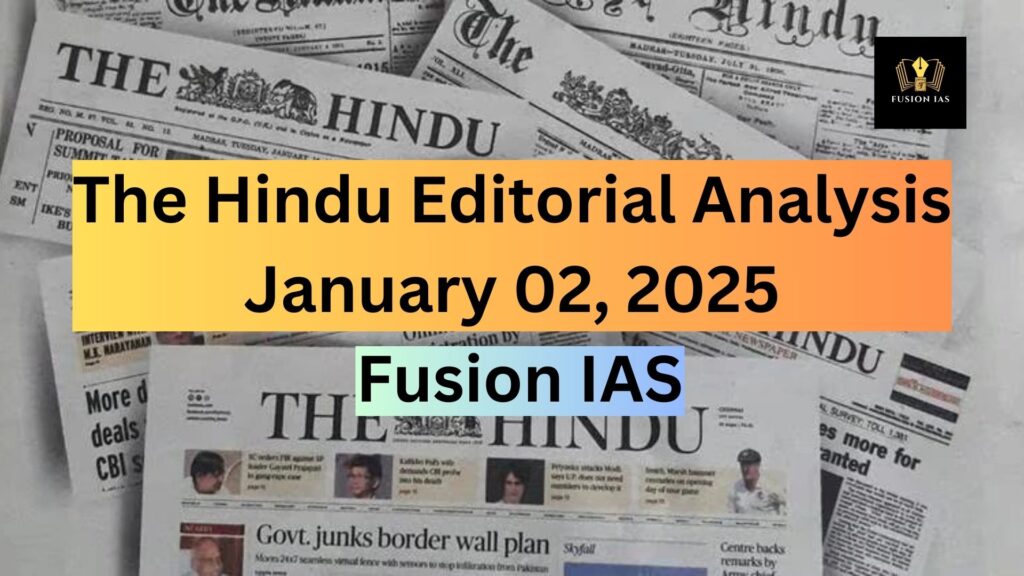
Analyzing editorials from The Hindu is a crucial component of Civil Services Examination preparation. These editorials offer insightful perspectives on current national and international issues, fostering critical thinking and enhancing one’s understanding of diverse topics relevant to the UPSC syllabus. Through this analysis, aspirants can refine their skills in comprehension, articulation, and issue-based evaluation, which are essential for the Preliminary, Mains, and Interview stages of the examination.
1. The Sorry State of India’s Parliamentary Proceedings
Diminishing Role of Parliament: A Threat to Indian Democracy
India’s Parliament, long regarded as the temple of democracy, is undergoing a significant crisis. The winter session showcased a disturbing decline in its functioning, with disruptions, adjournments, and demonstrations overshadowing meaningful legislative work. This deterioration reflects deep systemic and behavioral issues that threaten the very fabric of India’s democracy.
Key Observations from the Winter Session
- Unprecedented Disruptions
- Competitive Disruptions: Both Opposition and Treasury benches engaged in disruptive tactics. Demonstrations escalated to altercations outside Parliament, tarnishing its dignity.
- Adjournments Over Discussions: The session witnessed frequent adjournments, leaving little room for debate or productive work.
- Erosion of Decorum and Norms
- Historical Precedents:
- Disruptions have become normalized, considered by some as a democratic right for an outnumbered Opposition.
- Efforts by previous Speakers like Somnath Chatterjee to enforce discipline were hindered by political resistance.
- Current Approach:
- Speaker Om Birla has occasionally suspended MPs but often resorts to adjournments. This approach highlights the lack of consensus to enforce stricter rules.
- Historical Precedents:
The Breakdown of Civility Between Government and Opposition
- Loss of Trust and Goodwill
- In the past, leaders like Nehru, Vajpayee, and Narasimha Rao fostered a culture of civility, even during intense political rivalries.
- Today, mutual distrust dominates. The ruling party labels the Opposition as “anti-national,” while the Opposition likens itself to righteous underdogs battling unfairly powerful adversaries.
- Partisan Behavior
- The ruling BJP, which once championed disruptions as a tool for accountability when in Opposition, now condemns the same tactics.
- The Opposition retaliates with disruptions of its own, perpetuating a vicious cycle of partisanship.
Decline in Parliamentary Representation and Performance
- Shift in Public Expectations
- In earlier decades, skilled debaters and orators like Ram Manohar Lohia and George Fernandes earned respect for their contributions to parliamentary debates.
- Today, MPs are judged more for their local political influence and media presence than for their legislative abilities.
- Disconnect Between Electability and Parliamentary Skills
- Parliamentarians are often rewarded for disruptive tactics over substantive debates, reflecting a focus on optics rather than governance.
- Parliamentary standards have declined as MPs prioritize political loyalty over meaningful legislative contributions.
Government’s Approach to Legislation
- Marginalization of the Opposition
- The BJP government has frequently bypassed meaningful consultation with the Opposition, rushing through bills with minimal debate.
- This approach undermines Parliament’s role as a deliberative body in a democracy.
- Minimal Engagement by Leadership
- Unlike Jawaharlal Nehru, who actively participated in parliamentary proceedings, Prime Minister Narendra Modi’s limited presence signals a lack of commitment to the institution.
Consequences for Indian Democracy
- Parliament’s Reduced Relevance
- The frequent disruptions and lack of effective functioning diminish public trust in Parliament as a democratic institution.
- The lack of engagement and debate risks transforming Parliament into a mere formality rather than a vibrant forum for governance.
- Democracy at Stake
- The weakening of Parliament threatens the broader democratic framework, as it is meant to represent the will of the people and ensure accountability in governance.
Conclusion
The current state of India’s parliamentary proceedings is a wake-up call. Restoring trust, civility, and a commitment to meaningful debate is essential to preserve the sanctity of Parliament. Without such reforms, India risks losing the very institution that forms the backbone of its democracy.
2. Tackling Delimitation by Reversing Population Control
A Simplistic Solution with Complex Implications
The recent discussions on delimitation and its implications for political representation have sparked reactions from southern Indian leaders. The proposed delimitation exercise could potentially reduce parliamentary seats for States like Andhra Pradesh and Tamil Nadu, which have successfully managed fertility transitions and reduced population growth. This raises concerns about whether reversing population control could address this imbalance, but the complexities suggest otherwise.
Key Concerns Raised by Southern Leaders
- Impact of Fertility Transition
- Southern States are concerned that their success in population control will lead to reduced political representation.
- The Chief Ministers of Andhra Pradesh and Tamil Nadu, N. Chandrababu Naidu and M.K. Stalin, respectively, have voiced their discontent.
- Chandrababu Naidu: Advocated for policies incentivizing larger families, even suggesting reversing earlier legislation that barred individuals with more than two children from contesting local elections.
- M.K. Stalin: Questioned the rationale behind limiting family size, humorously suggesting aiming for 16 children.
- Unintended Consequences
- The loss of parliamentary seats could disproportionately affect States that have prioritized development through population control.
- This perceived penalty undermines efforts toward sustainable population growth.
Lessons from Global Experiences
- China’s One-Child Policy
- The policy achieved population control but led to severe unintended consequences:
- Imbalanced population composition.
- Increased dependency burden.
- Extremely low fertility rates difficult to reverse.
- The policy achieved population control but led to severe unintended consequences:
- Pro-Natal Policies in Other Countries
- Attempts by countries like Japan and South Korea to incentivize higher fertility rates have shown minimal success.
- Forced or incentivized fertility reversals often fail to address long-term demographic and societal challenges.
Challenges in Reversing Fertility Decline
- Natural Course of Fertility Transition
- Fertility decline is largely irreversible through state intervention.
- Incentives to encourage higher fertility have limited impact on reversing trends.
- Impact on Women
- Women bear the disproportionate burden of reproduction.
- Without adequate social support and compensation, encouraging higher fertility becomes untenable.
- Population Composition
- Artificially altering fertility rates can disrupt the natural demographic balance, leading to long-term socio-economic challenges.
Population and Political Representation
- Demographic Divide
- Population counts across Indian States show a demographic divide, with southern States achieving fertility decline earlier.
- This demographic divide must be considered in determining political representation.
- Rethinking Representation Criteria
- A purely population-based approach to representation risks penalizing States that have successfully controlled their population.
- Representation could be adjusted based on developmental factors like education, economic contribution, and demographic characteristics.
Alternative Solutions to Address Imbalances
- Promoting Migration
- Migration from high-population regions to low-population ones could balance regional population disparities.
- Revising Delimitation Principles
- Political representation should incorporate factors beyond population counts, ensuring fairness to States that have achieved development through population control.
- Enhancing Support Systems
- Providing robust social and financial support for women and families to mitigate the personal and societal costs of reproduction.
Conclusion
Reversing fertility as a solution to the delimitation issue is simplistic and impractical, given the natural progression of demographic transitions and global experiences. Instead, the focus should be on revising population-based political representation to account for developmental achievements and demographic characteristics. Encouraging migration and providing better social support can also address regional population imbalances more effectively than attempting to reverse fertility decline.
3. Too Little, Too Late: On Manipur and the Home Ministry’s Self Pat
A Reality Check on Conflict and Peace in Manipur
Conflict resolution requires not just rhetoric but tangible actions that address underlying issues. The Union Home Ministry’s claim of “unprecedented success” in fostering peace in the North East contrasts starkly with the ongoing turmoil in Manipur. The ethnic violence that erupted in May 2023 continues to disrupt the State, raising serious questions about the effectiveness of the government’s approach.
Manipur: A False Sense of Peace
- Unresolved Hostilities
- Violence persists with sporadic skirmishes, reflecting deep-seated animosity between ethnic groups.
- A lack of dialogue between conflicting communities undermines the prospects of reconciliation.
- Political Apathy
- Chief Minister N. Biren Singh’s recent apology for ethnic violence is seen as belated and insufficient.
- His government struggles to gain the trust of at least one major ethnic community, weakening its credibility.
- Restrictive Measures
- The reimposition of the Protected Area Regime in December signals ongoing security concerns.
- Labeling refugees from Myanmar as “infiltrators” risks worsening ethnic tensions in Manipur, Mizoram, and Nagaland.
Flawed Approach to Refugees
- Humanitarian Concerns
- Refugees fleeing Myanmar’s junta repression are escaping atrocities, not infiltrating for nefarious purposes.
- Treating them as security threats could destabilize already fragile ethnic relations in border States.
- Need for a Humane Policy
- The MHA should prioritize conducting a proper census and formulating compassionate refugee policies.
- A collaborative effort with State governments is essential to address the refugee crisis constructively.
Reassessing Peace and Prosperity Claims
- Misleading Narratives
- The MHA’s self-congratulatory claims fail to acknowledge the stark reality in Manipur.
- Persistent violence and restrictive measures undermine the narrative of peace and progress.
- Perception vs. Reality
- Efforts to project an image of success cannot substitute for genuine conflict resolution and trust-building initiatives.
The Path Forward
- Fostering Dialogue
- Building bridges between conflicting communities through sustained dialogue is critical.
- Confidence-building measures should be prioritized to restore trust and reduce hostilities.
- Refugee Policy Reform
- Recognize refugees as victims of repression and develop policies to integrate and support them.
- Avoid actions that exacerbate ethnic tensions in the region.
- Transparent Governance
- Admit failures and take corrective actions rather than issuing misleading assessments.
- Work towards inclusive governance that ensures representation and fairness for all ethnic groups.
Conclusion
Manipur’s ongoing conflict underscores the disconnect between the MHA’s claims and ground realities. Genuine peace and prosperity in the region require a shift from self-praise to proactive measures that address core issues. Dialogue, transparency, and a humane approach to refugees are essential to rebuild trust and lay the foundation for lasting peace.
4. Farm Fire: On the Fast by Jagjit Singh Dallewal, Farmers’ Demands
A Call for Dialogue and Resolution
Jagjit Singh Dallewal, the 70-year-old leader of the Samyukt Kisan Morcha (Non-Political), has been on an indefinite fast since November 26, demanding action on several key issues affecting farmers. His fast, which has now lasted for over a month, has garnered attention both in Punjab and nationally, especially after the Supreme Court intervened to ensure he receives medical aid. However, the larger issue remains unresolved, and the fast has become a focal point for ongoing farm protests.
The Demands and the Crisis in Agriculture
- Farmers’ Demands
- Legalized Minimum Support Price (MSP): A formula based on the National Commission on Farmers (M.S. Swaminathan).
- Debt Waiver for Farmers: Relief from mounting agricultural debts.
- Withdrawal of Cases: Against farmers protesting the three now-repealed farm laws.
- Support and Solidarity
- On December 30, farmers from various organizations, including the Samyukt Kisan Morcha, Bharatiya Kisan Union (Ekta-Ugrahan), and All India Kisan Sabha, supported Dallewal’s cause through a Punjab bandh.
- Opposition parties have also called for a dialogue between the farmers and the Union Government.
Legal Intervention and Its Implications
- Supreme Court’s Role
- The Court has intervened, allowing the Punjab government time until Thursday to ensure Dallewal receives medical care. However, it is debatable whether the Court’s involvement is helpful in such situations where law, policy, and politics are intricately linked.
- The court’s ultimatum has raised concerns about the balance between judicial intervention and the government’s responsibility to manage such protests proactively.
- Farmer Leaders’ Views
- Several farmer leaders have requested Dallewal to end his fast, urging him to join collective protests instead.
- His supporters, however, have rejected these calls, viewing them as attempts to undermine the fast and accusing other leaders of being government agents.
The Perils of a Fast Unto Death
- The Dangers of Prolonged Fasting
- The fast has raised concerns about Dallewal’s health, particularly given his age and cancer diagnosis.
- There is no clear way to determine if he is being coerced into continuing the fast, which complicates the situation further.
- The Government’s Responsibility
- The Punjab, Haryana, and Union governments must act swiftly to prevent the situation from escalating into a tragedy.
- It is critical that they engage with farmers’ leaders and address the longstanding issues affecting the agricultural sector.
Moving Forward: A Call for Dialogue
- Why Dialogue is Crucial
- The demands raised by the farmers have been pending for years, and the ongoing agricultural crisis requires urgent resolution through dialogue.
- A permanent solution cannot be achieved through fasts or protests alone; government intervention and active engagement with farmers are necessary.
- Ensuring a Constructive Path
- The focus should shift from symbolic gestures like hunger strikes to substantive discussions on policy changes that can alleviate the burden on farmers.
- The government must ensure that farmers’ voices are heard and that solutions are found to address the pressing issues in agriculture.
Conclusion
Jagjit Singh Dallewal’s indefinite fast has brought the issues faced by farmers back into the national spotlight. However, the demands are complex, and the situation requires careful, proactive handling by both the government and farmers’ organizations. Rather than resorting to extreme measures, it is time for constructive dialogue to resolve the issues and avoid further escalation of the crisis.
5. Karnataka Woman Minister on the Receiving End: A Deeper Look at Sexism in Politics
The Case of Minister Lakshmi Hebbalkar and the Alleged Remarks of C.T. Ravi
In Karnataka, a controversy has erupted after BJP MLC C.T. Ravi allegedly used derogatory remarks against Minister for Women and Child Development Lakshmi Hebbalkar. This incident highlights deeper issues of sexism in politics and the treatment of women in the public sphere.
Background of the Incident
On December 19, 2024, after the Karnataka Legislative Council had been adjourned, a verbal altercation between political leaders continued in the chamber. It is here that Mr. Ravi allegedly used a sexist slur against Ms. Hebbalkar. The incident, caught on video, quickly circulated on social media, despite there being no official record from the session.
- Mr. Ravi’s Denial and Allegations
Ravi initially claimed he had said “frustrate” and that Ms. Hebbalkar had misheard him. However, Ms. Hebbalkar and others present in the chamber stated that the term used was abusive and disrespectful, trivializing her hard-earned political career. - Legal Action
Following the incident, Ravi was arrested and booked under Sections 75 and 79 of the Bharatiya Nyaya Sanhita (BNS), which deal with sexual harassment and acts intended to insult the modesty of women. Ravi was later released by the Karnataka High Court after it found procedural errors in his arrest, as the police had not followed proper procedures before detaining him.
The Political Backdrop and Reactions
- BJP’s Response
- After the arrest, BJP leaders, including B.Y. Vijayendra, came to Mr. Ravi’s defense, accusing the police of being too swift in their actions. Mr. Ravi also appeared at press conferences, claiming injuries from police custody, which further fueled the controversy. His supporters rallied behind him, leading to factional politics within the BJP taking center stage.
- Congress Government’s Handling of the Situation
- The Congress government, particularly the Home Minister, came under scrutiny for the handling of the case. The court highlighted procedural flaws in Ravi’s arrest, while questions were raised about the jurisdiction of the incident, as it took place within the Legislative Council.
The Larger Issue: Sexism in Politics
While the political drama around the case continues, the core issue—the alleged sexist abuse of Karnataka’s lone woman Minister in the Cabinet—has been somewhat overshadowed. This incident, sadly, is not an isolated one, as casual sexism remains prevalent in political circles, across party lines.
- A Question of Gender Balance
- The question arises: Would such remarks have been made in a legislative body with a better gender balance?
- The underrepresentation of women in politics often leads to a lack of accountability for such remarks and behaviors.
- Sexual Harassment in the Workplace
- Why do such incidents, which would likely be considered sexual harassment in a workplace, not attract similar condemnation in the political arena? The case underscores the need for stronger safeguards for women in politics.
Conclusion: A Fleeting Issue in the Political Drama
As political dramas in Karnataka continue to unfold, the case of Lakshmi Hebbalkar may soon fade into the background. The opposition, now focusing on other issues such as the suicide of a contractor allegedly linked to a Minister’s aide, may cause this case to lose traction. Yet, the fundamental issues of sexism and the treatment of women in politics remain persistent. It is only a matter of time before another similar incident arises, underscoring the need for systemic change in the political landscape.
Source: https://www.thehindu.com/opinion/op-ed/karnataka-woman-minister-on-receiving-end/article69050791.ece
Also Read: The Hindu Editorial Analysis- Jan 01, 2025
Disclaimer:
This analysis is based on the editorial content published in The Hindu and is intended solely for informational and educational purposes. The views, opinions, and interpretations expressed herein are those of the author of original article. Readers are encouraged to refer to the original article for complete context and to exercise their own judgment while interpreting the analysis. The analysis does not constitute professional advice or endorsement of any political, economic, or social perspective.
Follow Fusion IAS


